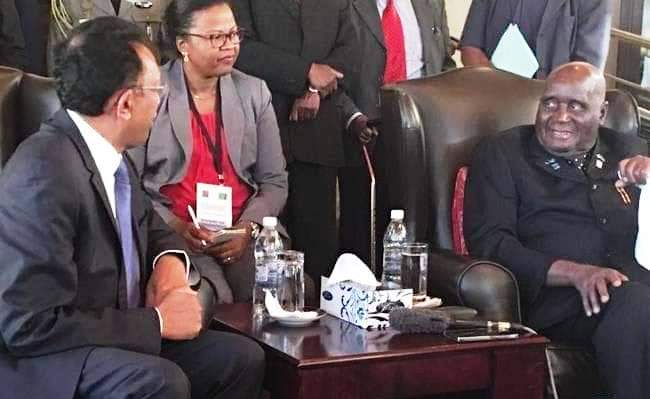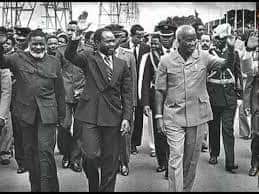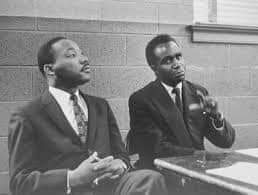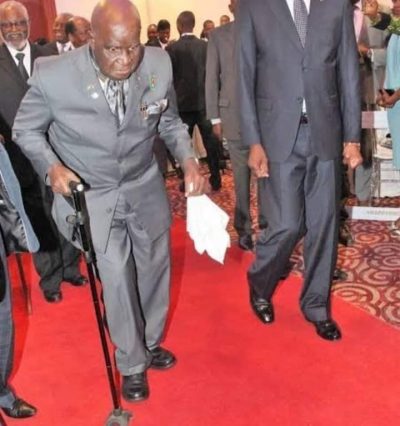CELEBRATING KENNETH KAUNDA

Kenneth Kaunda (Right) at his 96th birthday
Zambian founding president Kenneth Kaunda celebrated his 96th birthday, April This year.He’s the only African freedom fighters who have lived longer…Having ruled between 1964 – 1991.
Kenneth David Buchizya Kaunda is a living legend of pan-Africanism. He was a guardian of the Liberation Movement in the Southern Part of Africa.
Kenneth Kaunda became President of the Republic of Northern Rhodesia (Zambia) on the 24th October 1964 after a long struggle for independence that began in 1949.

As was the other patriarchs of pan-African Movement in Africa; Kaunda’s pan-African passions were awakened during the Fifth Pan-African Congress in Manchester in the UK that was held between 15th and 19th October 1945.
In this Congress most of the African leaders who later led their nations into independence attended. Among them were: Kwame Nkrumah, Jomo Kenyatta; Dr. Hastings Banda; Obafemi Awolowo; Julius Nyerere and Kenneth Kaunda.
In this congress the future leaders of Africa designed a strategy to oust colonialism in African and form a free united Africa.
Kwame Nkrumah concluding the meeting told his colleagues to go forth into the world to free their parts of Africa. He said: “…Now you’ve seen an independent state, we’ve had this big conference, now go on and free your part of Africa…”
In the story of Kenneth David Kaunda we tell the history of a living Pan-African; freedom fighter and an anti-apartheid leader. A companion of Julius Nyerere of Tanzania who formed the core of the Frontline States that were committed into liberating the Southern part of the African Continent.
Kenneth David Kaunda was born on the 28th April 1924 at Lubwa Mission in Chinsali the northern province of Northern Rhodesia now Zambia.
His father Reverend David Buchizya Kaunda, born in Nyasaland now Malawi was an ordained Minister of the Church of Scotland and teacher who had moved to Chinsali in Northern Rhodesia to work at Lubwa Mission.
Kaunda began his primary education at the Lubwa Primary School in 1932 and later he attended the Munali Training Centre in Lusaka between August 1941 and 1943 to become a primary school Teacher and Boarding Master at the Lubwa Upper Primary School. He then became the Headmaster at Lubwa Upper Primary School from 1943 to 1945.
Between 1948 and 1951 Kaunda worked as a teacher in various capacities but in April 1951, he resigned from the teaching career to begin his political life.
He became the Secretary of Northern Province for the Northern Rhodesia African National Congress (NRANC). He moved to Lusaka on the 11th November to become the NRANC Secretary General.
In 1955 Kenneth David Kaunda and Harry Mwaanga Nkumbula a nationalist and the President of the NRANC were imprisoned for two months accused of distributing subversive literature.
They were released and after a while they disagreed on issues of leadership and in October 1958; Kaunda broke away from the NRANC and formed the Zambian African National Congress (ZANC).
However, ZANC did not last as was banned in March 1959 and Kaunda was sentenced to nine months’ imprisonment in June 1959. While Kaunda was in prison, Mainza Chona broke away from the NRANC and formed the United National Independence Party (UNIP) in October 1959 and Chona became its first President.
In January 1960 Kaunda was released from prison and was elected President of UNIP. He then attended a Pan-African Freedom Movement for East, Central and Southern Africa (PAFMECA) Conference held in Mbale, Uganda from 24 to 25 December 1960.
In this meeting Kaunda showing his adamant belief in the pan-African concept he stated that: “…I am a Pan-Africanist and I believe in larger units. But this must be based upon the consent of the people…”

Kaunda and the American Civil Rights leader Martin Luther King Jr
In 1961 Kaunda visited the Civil Rights leader Martin Luther King Jr. in the USA. His visit galvanized his pan-African identity and strengthened his freedom fighting desire.
He returned from America in July 1961 a committed freedom fighter and organised a “disobedience campaign” that torched and obstructed major roads in the Northern Province; to force the Government consider granting independence to Northern Rhodesia.
After leaving office, Kaunda clashed frequently with Chiluba’s government and the MMD.
Chiluba later attempted to deport Kaunda on the grounds that he was a Malawian.
The MMD dominated government under the leadership of Chiluba had the constitution amended, barring citizens with foreign parentage from standing for the presidency, to prevent Kaunda from contesting the next elections in 1996.
Kaunda retired from politics after he was accused of involvement in the failed 1997 coup attempt.
After the coup, on Boxing Day in 1997 he was placed under arrest by Chiluba. However, many officials in the region appealed against this; on New Year’s Eve of the same year, he was placed under house arrest until the court date.
In 1999 Kaunda was declared stateless by the Ndola High Court in a judgment delivered by Justice Chalendo Sakala.A full transcript of the judgment was published in the Times of Zambia edition of 1 April 1999.Kaunda however successfully challenged this decision in the Supreme Court of Zambia, which declared him to be a Zambian citizen in the Lewanika and Others vs. Chiluba ruling.
After retiring, he has been involved in various charitable organisations. His most notable contribution has been his zeal in the fight against the spread of HIV/AIDS. One of Kaunda’s children was claimed by the pandemic in the 1980s. From 2002 to 2004, he was an African President-in-Residence at the African Presidential Archives and Research Center at Boston University.
In 2006, he was seen in attendance at an episode of Dancing with the Stars; Kaunda is an avid ballroom dancer.
President Michael Sata made use of Kaunda as a roving ambassador for Zambia. In February 2014 Kaunda was hospitalized for a fever at Lusaka Trust Hospital.



